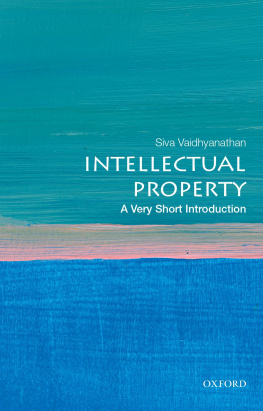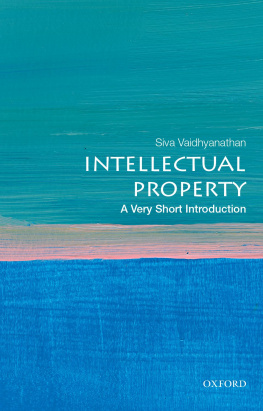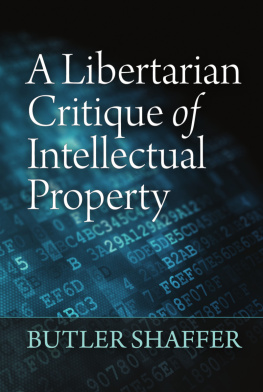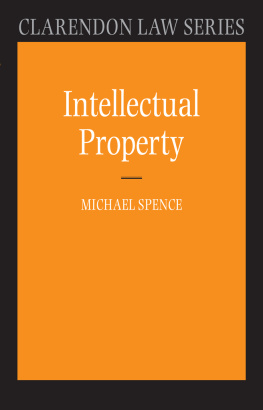AGAINST PROGRESS
AGAINST PROGRESS
Intellectual Property and Fundamental Values in the Internet Age
Jessica Silbey
Stanford University Press
Stanford, California
STANFORD UNIVERSITY PRESS
Stanford, California
2022 by Jessica Silbey. All rights reserved.
No part of this book may be reproduced or transmitted in any form or by any means, electronic or mechanical, including photocopying and recording, or in any information storage or retrieval system without the prior written permission of Stanford University Press.
Printed in the United States of America on acid-free, archival-quality paper
Library of Congress Cataloging-in-Publication Data is available upon request.
ISBN 9781503608306 (cloth)
ISBN 9781503631915 (paper)
ISBN 9781503631922 (electronic)
Cover design: Black Eye Design
Typeset by Newgen in Minion Pro 10.2/14.4
To Charlotte Silbey Dresser and Harper Silbey Dresser
Table of Contents
Acknowledgments
I wrote this book because I was not finished with my first one. I now understand that the feeling of being unfinished is a gift, not a burden, even if it haunts me. And so, I am grateful to friends, colleagues, and family, who keep me company and encourage me to continue in what seems like a project without end.
The intellectual property law community has been my academic home for fifteen years. In a book about intellectual property and fundamental values, I would be remiss not to acknowledge the exemplary moral leadership from some of the communitys senior scholars who model thoroughness, inclusivity, and broad-mindedness. To Maggie Chon, Rochelle Dreyfuss, Rebecca Eisenberg, Wendy Gordon, Jessica Litman, and Pamela Samuelson, thank you. So many of us humbly follow in your footsteps with profound gratitude and admiration.
Generous and insightful colleagues in both the IP and constitutional law communities helped me refine and rethink some of the books arguments. I am especially grateful to Olufunmilayo Arewa, Margo Bagley, Barton Beebe, Dan Burk, Colleen Chien, Margaret Chon, Danielle Citron, Julie Cohen, Frank Cooper, Carys Craig, Rebeca Curtin, Peter DiCola, Stacey Dogan, Abraham Drassinower, Rochelle Dreyfus, Christine Haight Farley, Brett Frischmann, Jeanne Fromer, Bill Gallagher, John Golden, Eric Goldman, Wendy Gordon, K. J. Greene, Leah Chan Grinvald, Woodrow Hartzog, Laura Heymann, Steve Jamar, Peter Jaszi, Ed Lee, Mark Lemley, Jessica Litman, Orly Lobel, Michael Madison, Linda McClain, Bill McGeveran, Mark McKenna, Michael Meurer, Joseph Miller, Lateef Mtima, Kali Murray, Ruth Okediji, Matthew Sag, Zahr Said, Pamela Samuelson, Miguel Schor, Patrick Shin, Robert Spoo, Kathy Strandburg, Eva Subotnik, Kara Swanson, Rebecca Tushnet, and Ari Waldman.
Northeastern University and the Northeastern University School of Law provided me with substantial support for this book. Deans Jeremy Paul and James Hackney supported my research every year with time, money, and enthusiasm. Northeastern University law students stoked my passion to connect constitutional values with intellectual property law, helping me to launch the Center for Law, Innovation, and Creativity (CLIC). The impressive interdisciplinary research and collaborations at Northeastern University also fueled this project. Thanks to Northeastern Universitys Humanities Center and the 20172018 Humanities Center Fellows for the year of engaging conversations, especially Lori Lefkowitz and Marina Leslie, and to the lively company and community of scholars at the NULab for Texts, Maps, and Networks for promoting the progress of science through the digital humanities.
I was honored to receive a Guggenheim Fellowship in 2018 to write this book. The Fellowship was vital to finishing the project and sharing it with a wider audience. More humbling than the award was for me meeting the other Fellows, diverse artists and scholars who are deeply engaged in their fields. This book is in large part about the kind of work to which they devote their lives and the values that sustain them.
A special thank you to my research collaborators Peter DiCola, Eva Subotnik, and Mark McKenna. I believe the best aspect of empirical research is teamwork. I will be on your team any time. Other team members include research assistants Todd Thurheimer, Jeremy Sternberg, and Brittany Von Rueden, transcriber Nita Sembrowich, and Atlas.ti guru Ayn Cavicchi. Our joint empirical work was supported by several grants: the Innovation Grant from the Spangenberg Center for Law, Technology, and the Arts at Case Western Reserve University School of Law (the photographer study) and the FSRP Initiation Grant from the University of Notre Dame (the design study).
At critical stages of this project, I received invaluable help from Nausicaa Renner, Stephanie Sykes, and the team at Stanford University Press (Michelle Lipinski, Kate Wahl, and Marcela Maxfield). Thank you for seeing this project through from beginning to end. Thank you also to Stanford University Press for committing with me to contract terms that assure accessibility of this book on terms that support both writers and readers.
I shared this work as it evolved with colleagues and students around the United States and abroad. Thank you for inviting and engaging with me: the American Bar Foundation, Bournemouth University (International Society for the History and Theory of Intellectual Property (ISHTIP 2021)), Boston College Law School, Boston University School of Law, Cardozo School of Law (the Roundtable on Empirical Methods in Intellectual Property), Case Western Reserve University School of Law, Chicago-Kent College of Law, Columbia University Law School (Kernochan Center for Law, Media, and the Arts), DePaul College of Law (IPSC 2018), Golden Gate University School of Law, Harvard Law School (the Berkman Klein Center and especially Susannah Tobins seminar), the Munich Summer Institute, Northwestern University, New York University School of Law (the Engelberg Center on Innovation Law and Policy), Stanford University (IPSC 2016), Toronto University School of Law (International Society for the History and Theory of Intellectual Property (ISHTIP 2017)), Texas A&M University School of Law, University of California Irvine School of Law, University of Connecticut School of Law, University of Georgia, University of Indiana McKinney School of Law, University of Miami School of Law, University of New Hampshire Franklin Pierce School of Law (MOSAIC 2019), University of North Carolina School of Law, University of Pennsylvania Law School (Copyright Scholarship Roundtable 2018), University of San Diego School of Law, University of Texas School of Law, University of Tulsa College of Law, University of Washington School of Law, Washington College of Law at American University, and Yale Law School (Information Society Project).
Portions of the book are adapted from previously published work. Parts of the introduction and .
The tail end of this project was completed as I began my tenure at Boston University School of Law. I am excited for what lies ahead and full of appreciation for the new academic family I am joining at Boston University. Thank you especially to Dean Angela Onwuachi-Willig for providing summer research funds to complete this manuscript.
My home family Keith, Charlotte, Harper, and our canine companions Louis and Oscar have been patient with me and provided perspective when most needed. Susan Silbey and Ruth Walsh complete the village. They are two of the kindest, fiercest, and smartest women I know. Together with Keiths equal partnership, my mother and Ruthie have more than anyone enabled my professional aspirations, helping me become a better teacher and scholar. I am lucky to love my work, and they create healthy and sustaining foundations for both work and love in my life. I am so very grateful.











